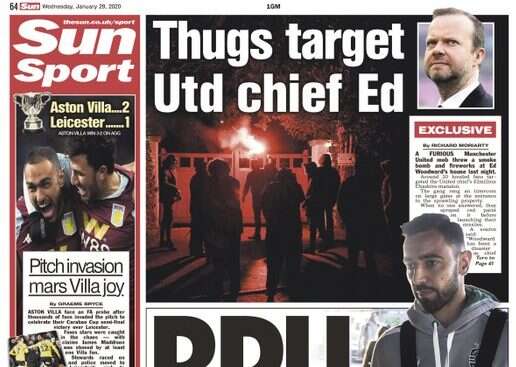
IPSO has sided with The Sun after Manchester United accused the newspaper of being “complicit” in an attack on its boss Ed Woodward’s home because it had a journalist and photographer present at the scene.
The regulator decided that ruling against The Sun “would directly inhibit the ability of journalists to report on matters of significant public interest”.
The football team complained to the regulator under the harassment and privacy clauses of the Editors’ Code of Practice, arguing the presence of a Sun journalist and photographer at the incident encouraged criminal damage and public order offences and that they should have informed the police after receiving a tip-off that a protest was planned to take place.
In an exclusive back page story on 29 January last year the Sun reported that around 20 hooded fans had thrown a “smoke bomb and fireworks” at Woodward’s house and sprayed red paint over the walls. Woodward and his family were not home at the time.
A second online-only story showed photos of the scene the following day, which the club argued gave too much information about the location and layout of Woodward’s home.
The protest came at a time when the club had fallen to eighth place in the Premier League, leading to criticism of Woodward.
The club issued a statement after publication that the journalist’s actions were a “clear breach” of “journalistic ethics”.
Manchester United argued in its complaint to IPSO that the journalist must have been aware of the nature of the attack either at the time of the tip-off or when he met up with them at a designated pub, because of their dress and demeanour.
However the newspaper said its reporter had been told only that a protest was planned in connection with the club, giving him no reason to believe it would be anything other than a peaceful protest and no indication he was to be led to Woodward’s home.
[Read more: Sun defends coverage of attack on Manchester United boss’s home seen by reporter]
IPSO concluded there was no evidence The Sun knew or could reasonably have suspected the plan involved an attack on a private home, that Woodward’s house was the target, or that there would be any criminal activity.
“In such circumstances, any decision taken by the publication not to alert the police or the complainants of the event was not capable of amounting to harassment or intimidation under Clause 3,” the regulator said.
At the event itself, The Sun said its journalist and photographer sought to distance themselves as much as possible, standing just close enough to see and hear what was going on. It said it obtained comments for the article after the event to limit interaction with the protesters.
The club argued that “by virtue of the attendance of the journalist and the photographer at the event, the publication had effectively encouraged the participants’ activities and that it had, therefore, assumed some responsibility for the event which amounted to harassment”.
In response, IPSO’s complaints committee “acknowledged the complexity of the role of a journalist as an observer at newsworthy events, and the potential for the presence of the press to affect the way such events unfold”.
But it ruled: “…there was no evidence that the publication was aware that crimes would be committed at the property, but even in the event that the publication had such knowledge, there is a public interest in the reporting of crime or the threat of crime.
“A finding that the attendance of the journalist and the photographer at the event, or that engaging with the participants to obtain information or to seek comment, amounted to harassment would directly inhibit the ability of journalists to report on matters of significant public interest.
“The Committee concluded that the attendance of the journalist and the photographer at the event in a professional capacity, and seeking information or comment from the participants, did not make them complicit, and did not constitute harassment under Clause 3 of the Code.”
IPSO also ruled that publishing photos showing the outside of Woodward’s home from the night of the event and the following day, along with a description of it as a “£2million Cheshire mansion”, did not breach Clause 2 (privacy) of the Code.
It said the information “would not reveal the location of the property to those who were not already aware of it” and that the exterior views in the photos could not “reasonably be said to present a risk to Mr Woodward’s security”.
Manchester United challenged IPSO’s findings to the Independent Complaints Reviewer, which decided the process was not flawed and did not uphold the request for review of the complaint.
The club claimed last year the case would be an “important test of the self-regulatory system for newspapers and its ability to uphold ethical standards in the press”.
Read the full IPSO ruling here.
Email pged@pressgazette.co.uk to point out mistakes, provide story tips or send in a letter for publication on our "Letters Page" blog
